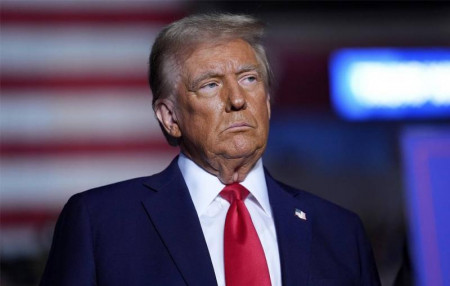
Trump regards Zelensky as a barrier to a peaceful solution of the Ukraine conflict; the Ukraine issue presents a challenge to the Group of 20; and the US may be evaluating a withdrawal from Syria. These stories have topped Friday’s newspaper headlines across Russia, according to TASS news agency.
Media: Trump sees Zelensky as hindrance to peaceful solution to Ukraine conflict
Vladimir Zelensky "better move fast or he is not going to have a country left," US President Donald Trump wrote on the Truth Social platform. Criticism from Washington followed after Zelensky replied to Trump’s remark about the need for elections by stating that it was impossible at the moment to hold a presidential vote in Ukraine, Vedomosti writes.
Tensions between Trump and Zelensky became evident after the February 12 phone call between the US leader and Russian President Vladimir Putin. Russian and US delegations held a meeting in Riyadh on February 18. Soon after, news came that for the first time since February 2022, the US had refused to sign a UN General Assembly resolution condemning Russia’s actions. In addition, the Financial Times reported that US representatives urged the Group of Seven (G7) not to label Russia an "aggressor" in its statement on the third anniversary of the conflict.
By criticizing Zelensky, the Trump team is attempting to make him step down and organize elections in Ukraine, political scientist Alexander Nemtsev pointed out. According to him, the US president believes that this will help advance Russia-Ukraine peace talks.
Trump’s goal is to find a resolution to the Ukraine conflict that will benefit the US, said Lev Sokolshchik, senior researcher with the Center for Comprehensive European and International Studies at the Higher School of Economics. The US president has actively tackled the issue and is now trying to remove all barriers hindering a solution, while Zelensky, in Trump’s view, resists US approaches, the analyst explained.
The exchange of words between Kiev and Washington marks the start of negotiations, Ivan Loshkaryov, associate professor with the Department of Political Theory at the Moscow State Institute of International Relations, observed. "This is how the Trump administration is shaping its approach to the Ukraine issue, trying to determine what the Ukrainian leadership is willing to do and how European countries are handling the fact that Zelensky will represent Ukraine," the expert told Izvestia. If it turns out that he isn’t of much value to the majority of the interested parties, the Trump administration may intensify pressure on Ukraine to hold elections and offer compromises to promote peace talks. However, if he is seen as useful, then a new situation will emerge in relations between the US and Ukraine, where military and political support will come in exchange for economic concessions, Loshkaryov suggested. However, there will be certain limitations because Ukraine has largely lost quality infrastructure.
Izvestia: Ukraine issue poses challenge to Group of 20
The G20 meeting of foreign ministers in Johannesburg briefly touched upon the Ukraine issue. South African President Cyril Ramaphosa highlighted the need to resolve conflicts diplomatically, openly acknowledging a lack of unity among G20 members. The recent contact between Russia and the US has probably widened divisions within the Group of 20, Izvestia notes.
Washington refused to send US Secretary of State Marco Rubio to the G20 meeting because of its tense relations with Pretoria. Meanwhile, Russian Foreign Minister Sergey Lavrov began his trip to South Africa in a successful way, holding several bilateral meetings.
The group’s multipolarity is reflected in the fact that this year, the G20 has for the first time assembled in an African country of the Global South. Besides, a BRICS nation is hosting G20 events for the third consecutive time. India and Brazil hosted the group’s meetings in 2023 and 2024, respectively. It would not be an overstatement to say that it’s a credit to them that the G20 agenda has not been as politicized in recent years as that of the Group of Seven.
Despite the anti-Russian rhetoric of many G20 nations, no one questions Russia’s participation in the G20. South Africa continues to engage with Russia on a number of issues despite the European Union’s calls for ending contact with Moscow, the African country’s President Cyril Ramaphosa told an Izvestia correspondent.
Western countries are being forced to adjust their views. The situation on the battlefield is changing, and the US position on the conflict has also changed, so those who were once determined to confront Moscow now have to factor this in, Andrey Kortunov, research director of the Russian International Affairs Council, pointed out. "Perhaps, the unification of the global majority, which was made clear at the BRICS summit in Kazan last year, has also played a role. One can say that the G20 is a sort of indicator, showing to what extent the leading players are ready to interact," the expert emphasized.
Izvestia: US contemplating withdrawal from Syria
It looks like the Kurdish forces that control the northeastern part of Syria are close to making a deal with Damascus. A local commander said that the Kurds were ready to join the unified army that the Syrian transitional government was establishing. This could help restore the country’s unity and create the conditions for the withdrawal of US troops, Izvestia writes.
US support has for a long time been the foundation of the Kurdish Syrian Democratic Forces’ (SDF) credibility, but Donald Trump has repeatedly spoken against maintaining US military presence in the region.
Danila Krylov, researcher at the Department of the Middle and Post-Soviet East at the Institute of Scientific Information on Social Sciences of the Russian Academy of Sciences, points out that the current US leadership seeks to find a way to decrease military presence in Syria. "In fact, the US has achieved its goal, albeit through someone else’s hands: Bashar Assad’s regime collapsed and Syria changed its political direction, even though it’s not clear where the country is now headed. That said, it would be reasonable to leave the territory now, relocating back to Iraq, for instance," the analyst said. In his opinion, Washington could see this as an excuse for withdrawing from Syria with its head held high, facing no political and reputational risks and losses.
Middle East expert Andrey Ontinov, in turn, notes that the Kurds are used to navigating through shifting circumstances, and their maneuvering depends directly on the US position. It is still unclear what Trump will do. He said during his first term in office that the Americans planned to pull troops out of Syria. "The Kurds now have very little room for maneuver. In the past, they could play on contradictions between three different forces," the expert explained. Now, one of those forces is actually gone. Today, the authorities in Damascus are very aligned with Turkey and therefore, the field for strategizing is shrinking for the Kurds, the expert concluded.
Media: Will Western oil and gas giants return to Russia?
A lively debate is underway in the media about whether Western oil and gas giants will return to Russia, Rossiyskaya Gazeta reports.
The move could benefit both parties. On the one hand, US and European companies had to leave a promising market with huge potential for the growth of hydrocarbon production. A return to Russia would mean resumed participation in the development of mineral resources, as well as guaranteed profits. On the other hand, when it comes to working on the continental shelf, where oil and gas are hard to obtain, Russian companies often lack the technologies and equipment that the US and Europe possess.
National Energy Security Fund Director Konstantin Simonov observed that foreign companies had not left Russia voluntarily. Still, businesses, particularly those in Europe, are used to keeping a close eye on regular practices and following them. As long as rules remain the same, it will be too early to talk about Western companies starting to return to Russia.
According to Oleg Abelev, head of analytics at the Ricom Trust investment company, there is a need for a decision on what to do with the assets of Western companies frozen in Russia and Russia’s frozen assets abroad. It’s premature to speak about the return of Western companies until such a decision is made, although it’s clear that they would be willing to come back. For many of them, the withdrawal from Russia was a political move that led to major economic losses.
Meanwhile, there is a split between G7 nations on whether to tighten sanctions against Russia’s oil industry, said experts interviewed by Izvestia. On February 24, the Group of Seven intends to announce plans to lower the price cap for Russian oil. However, experts see the initiative as nothing but a political public relations stunt because the US is unlikely to support a tightening of sanctions after the launch of dialogue between Washington and Moscow. Valery Andrianov, associate professor at the Financial University under the Government of the Russian Federation, stressed that first, Washington will not complicate dialogue on Ukraine by adopting new restrictions. Second, there is no point for the US to undermine and destabilize the global oil market. As for European countries, they don’t have mechanisms that could cause a significant reduction in Russia's oil exports.
Nezavisimaya Gazeta: Georgia happy for not being in Ukraine’s shoes
The conflict between Vladimir Zelensky and US President Donald Trump has made Georgian politicians reflect on what would have happened had Tbilisi been in Kiev’s position, Nezavisimaya Gazeta writes.
Georgian Foreign Minister Maka Bochorishvili has made it clear that it’s fortunate her country "is not on the same train as Ukraine." Tbilisi Mayor Kakha Kaladze, in turn, pointed out that Western partners had for a while tried to make the ruling party Georgian Dream's government open a second front against Russia. However, the Georgian cabinet stood its ground and can now be content with how things have turned out.
Meanwhile, the experience of the 2008 conflict shows that the US can leave its partners without military assistance if it believes that support is no longer in its national interests, said Denis Denisov, an expert at the Financial University under the Government of the Russian Federation. "Like in many other countries, a certain part of Georgian society tends to perceive everything that the US does solely in a positive way. The Georgian Dream party, in turn, seeks a balance between the East and the West, advocating its own interests," the expert noted.
Political scientist Petre Mamradze believes that the US authorities treat other countries as resources, which they are ready to use in their own interests, regardless of consequences. "In 2022, the US urged Georgia to hand all the weapons it had over to Ukraine. The Georgian authorities said they could not do that as the Russian army was stationed several dozen kilometers from Tbilisi and if a need arose, they would have nothing to defend themselves with.
The Americans suggested that they could go to the mountains and defend the country from there. Now, the US has a new president who calls for ending it all at once. This is the only right approach but who will compensate for Ukraine’s losses?" Mamradze said. According to him, Georgia could have found itself in a far worse situation had it agreed to open a second front against Russia.
TASS is not responsible for the material quoted in these press reviews




